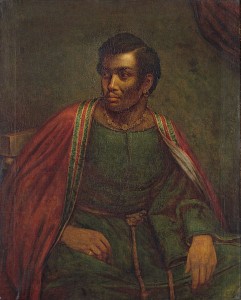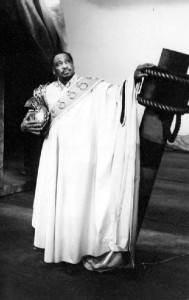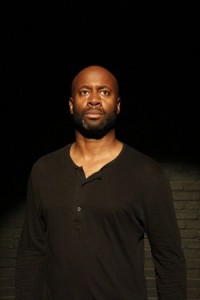We’re in the middle of Black History Month 2014, and it’s a good moment to draw attention to a major project on the history of non-white performers of Shakespeare. British Black and Asian Shakespeare is run by Professor Tony Howard of the University of Warwick with funding from the Arts and Humanities Research Council. Professor Howard has tracked the development of British Black and Asian actors on the Shakespearean stage from the 1930s to the present day and a database is being constructed that will document this work in full. There’s an 8-minute introduction to the project and its subject here.
The story begins back in the nineteenth century with the great black American actor Ira Aldridge who gained fame for his acting, in particular in Shakespearean roles. Aldridge came to Europe in 1824 and by the end of the 1820s had established himself as one of the most exciting of contemporary performers. As I’ve been researching the early celebrations of Shakespeare’s birthday in Stratford-upon-Avon I have wondered if it was Aldridge’s success that inspired the organisers of the 1830 celebrations to include, among the locals dressed up as Shakespeare’s characters, “Charles the Black”, a “man of colour”, as Othello. This was the most magnificent procession that had yet been seen, and was not matched for many years. A special pavilion was erected in Rother Street under the management of Francis Raymond who supplied the costumes that had been hired from the London theatres. Local newspapers and later reports mention the names of many who took part, but Charles was singled out by at least three of them. In the Theatrical Tatler, published in Birmingham, it was noted that “Some people extolled Othello who was personated by a black, in service (chiefly as Cook, I believe), at the Woolpack, Warwick.” I believe this was the first occasion when a black man had represented one of Shakespeare’s characters appeared in Stratford. Ira Aldridge himself did not perform in Stratford until 1851.
The most important black figure in twentieth century theatre was Paul Robeson who combined singing with acting on stage and screen. As a young man he performed Othello in London in 1930 with Peggy Ashcroft as his Desdemona, then played the role again at the end of his career in 1959 in Stratford-upon-Avon. In between he became a political activist in his native USA and his known communist sympathies made him a target during the McCarthy period when his passport was taken away. In spite of being much in demand in Europe he was unable to leave the USA, returning to Stratford to perform not long after his passport had been returned to him.
Next week, on Tuesday 21 October, at 1.45pm, BBC Radio 4 will be broadcasting a programme in the series Hidden Histories of the Information Age relating to Paul Robeson. In 1957 the transatlantic telephone cable was used to allow him to sing live from New York to an audience in London. At the time this was a technological marvel, but apart from the technical innovation the compelling reason for the broadcast was that Robeson was at the time banned from leaving the USA.
There is lots more information about Paul Robeson’s Othello and other more recent black Othellos in the podcasts linked to from this page. There’s also a blog with up to date information about the project, including a post by Dr Jami Rogers, now BBAS’s Honorary Fellow and Research Assistant, about the Shakespearean Glass Ceiling, reproduced in full here.
In celebration of Black History Month the Mercury Theatre Colchester is hosting the British Black and Asian Shakespeare’s exhibition until Saturday 18 October. It coincides with their production of Macbeth (also closing on Saturday) in which BBAS Honorary Fellow Nicholas Bailey is performing Macduff. Jami Rogers went to the opening night of the play and her interview with Nicholas Bailey is available here.
In another interview, Bailey talks about the aims of the project: “What we are trying to do is get all the surviving Black and Asian actors we can to be interviewed about their Shakespearean life and we want to get testimony, via our website, from audiences about performances they have seen involving Black or Asian actors. What we want to do is create a true history because it hasn’t been written or talked about with any authority until now”.





Thank you Sylvia for this blog and related links.
Ira Aldridge is recognised here in the Ira Aldridge Room at the Theatre Royal Newcastle.
I was of course very interested in Tony Howard’s piece on Sam Wanamaker and MI5.
Thank you very much for helping to spread the word.
A great group of researchers are working together here, with an enormous response from within the profession.
And in many cases the researchers ARE the profession. All praise in particular is due to Nick Bailey, whose Macduff at Colchester has brought the role – and the last third of the play – into heart-wrenching focus in a way I’ve never experienced before. There really is an extraordinary history of BAME Shakespearean performances to be celebrated, and a great future to be heralded as well.
Dear Tony,
A pleasure to be able to talk about such an interesting and valuable project. All the best of luck with it!
Thanks Alan, I didn’t know there was an Ira Aldridge room!
I love this article. Thanks you so much for sharing. As an American actor/director, I find that stories such as these are much lacking in our dialogue about William Shakespeare and the performances of his work.
I’m currently attempting to right this deficiency by making a film adaptation of Shakespeare’s Julius Caesar, with a diverse cast of actors in a contemporary context.
Please check out our Kickstarter Campaign and support our work, bringing diversity to the face of Shakespeare today.
http://kck.st/1sYZORa
Thank you, Sylvia, for the work you do.
Devin